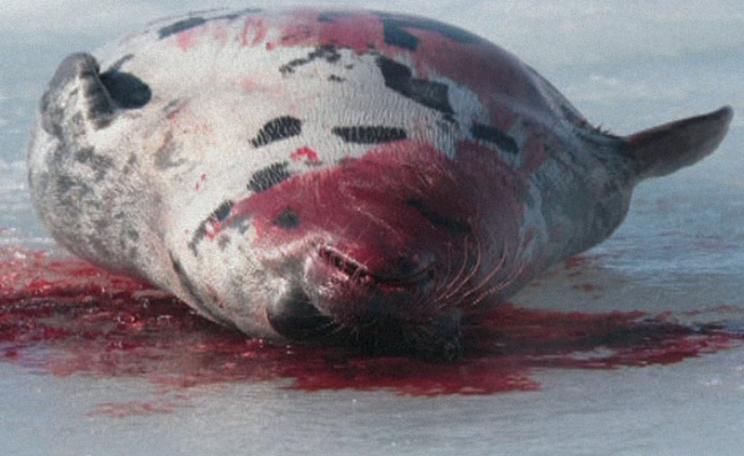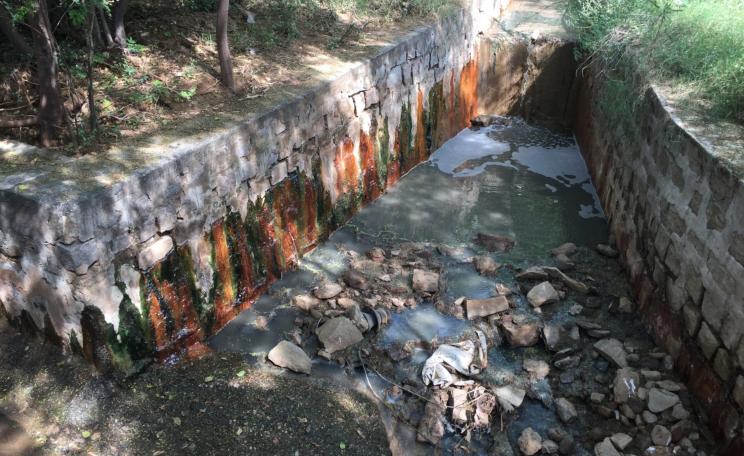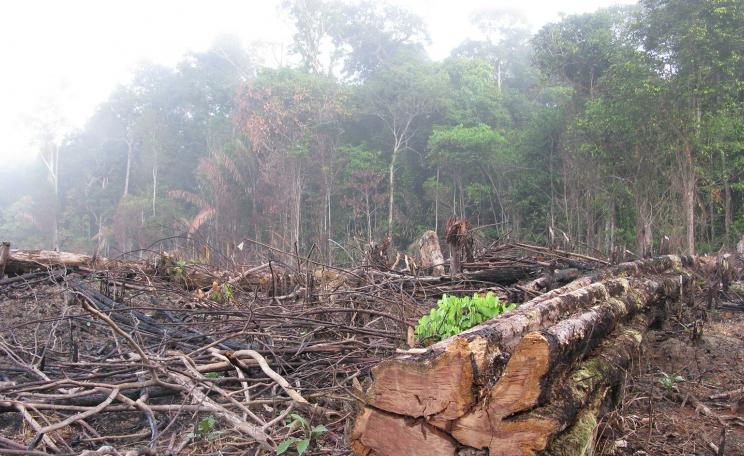The building, in a ubiquitous leafy street in south-west London, is unremarkable, but this Fulham house is at the centre of a controversial plot that reads like something out of an Ian Fleming spy novel.
It is the home of Toby Kendall, an employee of the ‘special risk management’ and security consultancy C2i International, who went undercover to spy on members of Plane Stupid, a group tackling the aviation industry head on. Operating under the pseudonym Ken Tobias, Kendall, 24, spent a year covertly gathering information on Plane Stupid, attending meetings and participating in protests. Kendall’s infiltration was exposed when Plane Stupid fed the Oxford-educated ‘activist’ false information that found its way back to the aviation industry and journalists.
He wasn’t in when the Ecologist visited – sources say he is currently in China, though still on the payroll of C2i International – but the affair is the latest in a series of attempts to thwart the UK’s fast-growing climate campaign movement.
Plane Stupid and other climate campaigners have increasingly found themselves on the receiving end of a disturbing pattern of legal threats, injunctions, dawn raids, arrests, solitary confinement, espionage and sensationalist press smears.
Although radical environmentalists have long been targeted – as the battle lines between big business, the Government and climate activists are drawn ahead of August’s ‘Climate Camp’ at Kingsnorth power station, in Kent – campaigners are warning that the situation looks set to heat up for an unprecedented showdown.
Plane Stupid is at the forefront of this looming confrontation. Set up in 2005 by a young group of activists wanting to disrupt an aviation conference in a London hotel, the campaign has helped put climate change – and those responsible for `it – both on the political map and the front pages.
Building on the principles of non-hierarchical organisation and direct action advocated by anti-roads groups such as Earth First! and Reclaim The Streets a decade ago, Plane Stupid offers an umbrella for as many as 200 climate activists operating across the UK.
The group has occupied airport runways, closed down aviation meetings, blockaded travel agents, disrupted parliamentary business and demonstrated on the roofs of the Westminster and the Scottish Parliament. Such actions, combined with a rare accountability and a highly media-savvy approach, has led to the group being dubbed the ‘new pin-ups of the environment movement’ and won them support from a variety of quarters.
A direct-action collective
‘We realised across the country, outside every airport where there are expansion plans – which is almost every airport in Britain – there are well-established residents campaigns concerned about noise, about air pollution and, in the case of Heathrow, about house demolitions and ancient woodlands [being destroyed],’ says Joss Garman, a Plane Stupid founder and Ecologist columnist. ‘We wanted to bring these [groups], which were using conventional campaigning methods, together with the environmental movement, and with direct action in particular, as had been done with the anti-roads movement.’
One major difference between the antiroads movement of the 1990s and the contemporary climate campaign is the reaction of more mainstream NGOs.
When the bulldozers rolled in to the Twyford Down motorway extension near Winchester in 2003 and were physically blocked by Earth First!, many in traditional environmental circles were critical, worried about the bad press the ‘dreadlocked anarchists’ would bring to their cause. Such fears were exacerbated when clashes between the protesters and hired security turned ugly, and were fuelled further by tabloid scaremongering over ‘militant activists’. Fast-forward to the present, however, and most of the larger environmental NGOs are happy to support Plane Stupid and other similar groups.
‘This new breed of activism [on climate issues] has actually given a much-needed wake-up call to the movement as a whole,’ one seasoned campaigner said. ‘It has reawoken interest in, and support for, more radical action.’ Although having the highest profile, Plane Stupid represents only part of the new climate campaign movement.
Rising Tide, the global network of direct action groups focused on climate-related issues, caught the imagination of many when it began proactively targeting the companies blamed for the looming climate catastrophe. In 2007, the group famously invaded the Natural History Museum in London and threw oil across wildlife photographs to protest at oil giant Shell’s sponsorship of the annual exhibition. Shell has said it will no longer be sponsoring the event.
‘One of the things about Rising Tide is that every day is a day for direct action,’ commented one Rising Tide activist, Iggy. ‘If you look around you’ll find something that is wrong. An example would be Newcastle, in Australia, one of the world’s largest coal ports. Rising Tide shut that down with boats. More locally, if you throw a stone you’ll hit a headquarters of a business that is investing in a [oil] pipe running through somewhere.’
The group admits it is at the radical end of the current surge in climate campaigning – some members believe the only way to tackle climate change is to confront capitalism headon – but Rising Tide draws its ‘membership’ from a remarkably diverse range of people. Indeed, when the Ecologist was invited to meet with a number of climate activists planning forthcoming actions it was told in advance ‘you’ll be surprised at some of the people involved: nurses, IT workers, a chef...’
Such is the perceived threat posed by the growing wave of climate activism that those whose business interests are under fire – and the authorities – have begun to strike back. Although it has yet to be established who hired C2i International to infiltrate Plane Stupid – initially BAA, owners of Heathrow, denied any involvement, before backtracking to admit it had been ‘approached’ by the security firm – the affair is illustrative of the lengths aviation and energy corporations are prepared to go to thwart activists.
The powers that be overreacting
Plane Stupid members first found themselves – collectively – on the receiving end of the long arm of the law when in 2006 they occupied the runway of Nottingham’s East Midlands airport in an action drawing attention to the environmental carnage caused by flying.
Having delayed hundreds of passengers, they were arrested and later charged with aggravated trespass and causing a public nuisance. Several of the activists – including Rose and Ellen Rickford, then aged just 21 and 18 respectively – later claimed they were held in solitary confinement for more than 24 hours, that their houses were raided and computers, phones, diaries and address books confiscated.
Malcolm Carroll, a Baptist minister and Greenpeace campaigner, who was also arrested after the Nottingham action, says he was shocked that the police classified the protest as a major terrorist incident, bringing in armed police, helicopters and hostage negotiators. “[The] police raided [me] twice, came back twice. My son thinks at one occasion they had a firearm. As a parent, now that really troubles me. It probably upsets me more than anything,’ says Caroll. ‘But they took this stuff: my computer, phone, his computer, his mobile phone, for goodness’ sake. They took my records, my files... well, they didn’t take the files, they took my entire filing cabinet – a big four-drawer filing cabinet of personal stuff and family memories and that sort of business.’
Controversial police action followed at last year’s Climate Camp at Heathrow airport, where officers invoked anti-terror legislation to police the event. The powers enabled them to stop and search whomever they wished, hold people for up to a month without charge and raid activists’ houses. One activist, student Christina Fraser, was stopped while riding a bicycle near the airport, held for 30 hours under suspicion of terrorism and then charged with conspiring to cause a public nuisance.
BAA had earlier sought an unprecedented injunction against organisers of the Climate Camp, claiming the planned protests would expose the airport to the risk of terrorism, and citing the Protection from Harassment Act. Although the injunction named only four people in particular, by including five protest groups it threatened to affect more than five million individuals and was described by the defence as ‘the most extraordinarily wide-ranging injunctive relief that has ever been sought from the courts of this land’.
In Oxfordshire, opponents of RWE nPower’s moves to drain Radley Lakes in order to turn them into an industrial dump found themselves subjected to a similarly draconian injunction, preventing them from coming to, remaining on, trespassing or holding demonstrations on the company’s land.
Those that did attempt to approach would have been faced by security guards wearing masks or balaclavas and filming and photographing protesters. Adrian Arbib, a news photographer, was also later served with a high court injunction by two solicitors and four ‘black-clad’ security guards working for nPower, apparently in an attempt to prevent him documenting the company’s activities.
More recently, after a biofuels demonstration in Edinburgh, activists claimed they were subjected to a ‘massive police overreaction’ and deprived of food, water and medical attention while being held in cells after being arrested. Some of the activists say they’ve since been woken in dawn raids by the police, and asked to become paid informers. Rising Tide says it too has encountered problems, that the amount of police surveillance activists now encounter is dramatically increasing and that individuals are being targeted.
Although disturbing, veteran campaigners say the experiences of the climate campaign movement are not entirely unique, and that protest movements of past years also encountered similar levels of surveillance, infiltration and harassment.
Paul O’Connor, from radical news agency Undercurrents, which has reported on the UK’s protest movement since 1994, told the Ecologist: ‘Over the years we’ve noticed that time and again the harassment starts before a protest, where they have undercover policemen, secret [detective] agencies infiltrating protest groups to try to find out who these people are and what they are planning next.’ According to Undercurrents, the Toby Kendall affair comes on the back of a string of similar infiltration attempts.
The spying game
In the 1990s, it emerged that campaigners battling McDonald’s were constantly spied upon by undercover agents working for the corporation. Protesters targeting the Newbury bypass were infiltrated, too – by detective agencies passing on information to Group 4, the outfit hired by the Government to protect its road-building programme.
More recently, the Campaign Against the Arms Trade was targeted by spies working on behalf of BAE Systems, and anti-Iraq War protesters claim they have been subjected to similar attempts. Previously, Reclaim The Streets – the anti-car-culture party collective – and hunt saboteur groups have alleged they have been targeted by detective agencies and undercover police.
Video-journalists seeking to cover events from the point of view of activist groups have also found themselves in the firing line. They claim there has been a documented pattern of police – and others – attempting to ‘manage’ the news in relation to protest issues.
‘Over the years, reporting on all these different type of protests, nearly all the people working for [Undercurrents] have been arrested at some stage,’ says Paul O’Connor. ‘We have probably had about 15 cases now, and what’s interesting is that none of our journalists has been charged; it’s a constant thing that we are arrested, seized and held in police custody until after the deadline for the news have passed.
The only thing we can say is that’s news management.’ Such was Undercurrents’ concern about police attempts to thwart their reporting of protests that it produced a groundbreaking documentary – Breaking News – dedicated to exposing the problem.
The film revealed some of the first hard evidence of police attempts to manage the news, including an incident where officers erased the contents of a tape containing film of a protest – but mistakenly recorded themselves doing so.
Some of the mainstream press have likewise been accused of presenting a sensationalist picture of climate campaigners.
London’s Evening Standard was recently rebuked by the Press Complaints Commission (PCC) after the newspaper was found to have run a highly inflammatory and inaccurate article alleging that during last summer’s Climate Camp, campaigners planned to bring Heathrow to a standstill – using hoax bombs and assaults on the airport’s perimeter fence. The case was one of the first to be brought by activists themselves and marks an important milestone, say campaigners, in standing up against the frequent attempts at smearing protest groups.
Campaigners say other news outfits have been equally guilty of creating scaremongering headlines; several further PCC adjudications relating to climate protest stories are in the pipeline, involving, among others, The Sun, the Telegraph and The Mail.
Organisers of this year’s Climate Camp at Kingsnorth say they are optimistic that the PCC’s ruling will discourage similar smear attempts around the protests next month, but are prepared to take a robust stance against those that try.
‘I’d be surprised if we don’t see one or two of the newspapers trying to stitch up [the Climate Camp] to suit their own agendas,’ one camp organiser says, ‘but we are looking at ways to minimise the opportunities [they get] to do hatchet jobs.’
Campaigners say they will be keeping an eye on the ‘spinning’ activities of E.ON, however, the company behind the planned development of Kingsnorth power station, as they prepare to defend their position in the face of the coming protests.
Last year BAA was accused of negative ‘spinning’ designed to influence the media and public against the objectives of climate campaigners. It emerged earlier this year that E.ON had secured the services of Edelman, the world’s largest independent public relations company, to manage its public affairs over the issue. Edelman represents, among others, Mars, Pfizer, Microsoft and Shell.
In the US, Edelman has been accused of faking blogs to promote the ethical integrity of WalMart, a client. Here, campaigners uncovered what they describe as unusually close links between Edelman and the Government.
Earlier this year it emerged the Department for Business, Enterprise and Regulatory Reform (BERR), the body responsible for decisions on the future of coal power, had appointed a new head of communications, Neil Spring – until recently chief lobbyist at Edelman.
Also until recently, one of Edelman’s directors was identified as Heather Rogers, wife of John Hutton MP, the head of BERR. Although there is no suggestion of illegality or wrongdoing, the cabinet minister has previously faced calls for an inquiry over his wife’s business interests as a lobbyist.
Although Edelman’s involvement over Kingsnorth has yet to correspond with any upsurge of anti-Climate Camp headlines, activists say the company’s appointment corresponds with a number of announcements that conveniently suit E.ON.
‘Suddenly, bizarrely, we have [E.ON] asking the Government to delay the final decision over Kingsnorth until after the summer’s actions, when [attention] will be on the issues,’ one Climate Camp insider said. ‘And the trial for [Greenpeace] activists charged after their occupation of the power station is, without explanation, delayed until after the camp.’
Locally, too, campaigners are critical of the ‘hyping-up’ of the forthcoming camp; police and local councillors have set up special hotlines for concerned residents to call if worried, and are encouraging local people to report ‘suspicious behaviour’ they think may be connected to the camp.
At two public meetings organised by the authorities to ‘reassure’ local people, opposition to the protests, according to some reports, has been overwhelming. When the Ecologist visited the region, however, most people appeared unaware of the protest, of E.ON’s plans for Kingsnorth or what it means for the local region and climate change as a whole.
Although some reports have played down the scale of the forthcoming action, organisers say they are confident of a large turnout, such is the growing support for campaigns highlighting climate issues. They also say that the number of people prepared to participate in direct action is growing.
‘The stakes are higher now than ever before and people are prepared to take a stand and to do something,’ says one London-based climate activist, who wished to remain anonymous. ‘In the past, with other [issues] people may have been wary about breaking the law or becoming involved in militant action, but with climate they’ve realised they have little choice.’
As the battle between climate campaigners, energy corporations and the Government heats up this summer, in a special film investigation to accompany this report the Ecologist Film Unit examines the truth behind the spin and the sensationalist headlines, and asks: who are the real eco-terrorists?
To watch the film, click here
Andrew Wasley is a journalist and producer at investigative agency Ecostorm (www.eco-storm.com)
This article first appeared in the Ecologist April 2009







